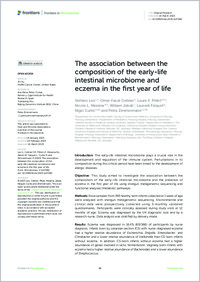The association between the composition of the early-life intestinal microbiome and eczema in the first year of life
DOKPE
- Zimmermann, Petra ORCID University of Fribourg
- Stefano, Leo University of Fribourg
- Faruk Cetiner, Omer Istanbul University
- Pittet, Laure F. University of Melbourne
- Messina, Nicole L. University of Melbourne
- Jakob, William Fribourg Hospital
- Falquet, Laurent University of Fribourg
- Curtis, Nigel University of Melbourne
- 16.03.2023
Published in:
- Frontiers in Microbiomes. - Frontiers Media SA. - 2023, vol. 2
English
Introduction: The early-life intestinal microbiome plays a crucial role in the development and regulation of the immune system. Perturbations in its composition during this critical period have been linked to the development of allergic diseases.
Objective: This study aimed to investigate the association between the
composition of the early-life intestinal microbiome and the presence of
eczema in the first year of life using shotgun metagenomic sequencing and functional analyses (metabolic pathways).
Methods: Stool samples from 393 healthy term infants collected at 1 week of age were analyzed with shotgun metagenomic sequencing. Environmental and clinical data were prospectively collected using 3-monthly validated questionnaires. Participants were clinically assessed during study visits at 12 months of age. Eczema was diagnosed by the UK diagnostic tool and by a research nurse. Data analysis was stratified by delivery mode.
Results: Eczema was diagnosed in 16.4% (60/366) of participants by nurse diagnosis. Infants born by cesarean section (CS) with nurse-diagnosed eczema had a higher relative abundance of Escherichia, Shigella, Enterobacter, and Citrobacter and a lower relative abundance of Veillonella than CS-born infants without eczema. In addition, CS-born infants without eczema had a higher abundance of genes involved in lactic fermentation. Vaginally born infants with eczema had a higher relative abundance of Bacteroides and a lower abundance of Streptococcus.
Conclusion: There is an association between the bacterial composition of the intestinal microbiome at 1 week of age and the presence of eczema in the first 12 months of life.
Objective: This study aimed to investigate the association between the
composition of the early-life intestinal microbiome and the presence of
eczema in the first year of life using shotgun metagenomic sequencing and functional analyses (metabolic pathways).
Methods: Stool samples from 393 healthy term infants collected at 1 week of age were analyzed with shotgun metagenomic sequencing. Environmental and clinical data were prospectively collected using 3-monthly validated questionnaires. Participants were clinically assessed during study visits at 12 months of age. Eczema was diagnosed by the UK diagnostic tool and by a research nurse. Data analysis was stratified by delivery mode.
Results: Eczema was diagnosed in 16.4% (60/366) of participants by nurse diagnosis. Infants born by cesarean section (CS) with nurse-diagnosed eczema had a higher relative abundance of Escherichia, Shigella, Enterobacter, and Citrobacter and a lower relative abundance of Veillonella than CS-born infants without eczema. In addition, CS-born infants without eczema had a higher abundance of genes involved in lactic fermentation. Vaginally born infants with eczema had a higher relative abundance of Bacteroides and a lower abundance of Streptococcus.
Conclusion: There is an association between the bacterial composition of the intestinal microbiome at 1 week of age and the presence of eczema in the first 12 months of life.
- Faculty
- Faculté des sciences et de médecine
- Department
- Master en médecine
- Language
-
- English
- Classification
- Pathology, clinical medicine
- License
- Open access status
- gold
- Identifiers
-
- DOI 10.3389/frmbi.2023.1147082
- ISSN 2813-4338
- Persistent URL
- https://folia.unifr.ch/unifr/documents/325438
Other files
DataSheet_3_The association between the composition of the early-life intestinal microbiome and eczema in the first year of life
Statistics
Document views: 134
File downloads:
- leo_microbiomeandeczema_frontmicrob_2023: 187
- DataSheet_3_The association between the composition of the early-life intestinal microbiome and eczema in the first year of life: 23
- DataSheet_2_The association between the composition of the early-life intestinal microbiome and eczema in the first year of life: 44

